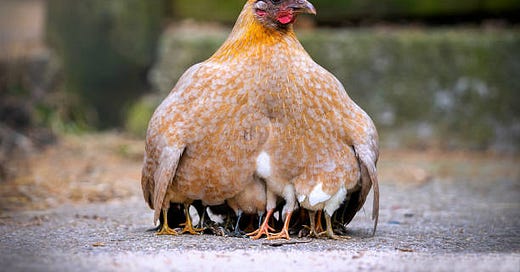I will say of the LORD, “He is my refuge and my fortress,
my God, in whom I trust.
Surely God will save you from the fowler’s snare
and from the deadly pestilence.
He will cover you with his feathers,
and under his wings you will find refuge;
his faithfulness will be your shield and rampart. (Psalm 91:2-4)
In the midst of feeling overwhelmed and discouraged by the brokenness of our world, Psalm 91’s breathtaking bird imagery caught me completely by surprise. The psalm came as a good word I didn’t know I needed. So I thought this week I’d invite you to nestle in to this remarkable metaphor, and then we’ll get back to Proverbs’ offer of a way forward in our political mess next week.
Psalm 91 piles up images of God as a refuge in a world filled with terror. He is a “shelter,” a “fortress,” a “dwelling.” His faithfulness is a “shield” and “rampart.” Such images, which depict YHWH offering powerful protection to humans, make sense in a world where “arrows fly.”
Yet v. 3a draws a different picture: a vulnerable bird in danger of the “fowler’s snare,” the “hunter’s trap.” That picture effectively communicates threat by describing a predator/prey scenario. A human “hunter” comes with a clever trap to ensnare the unsuspecting bird.
Part of the horror of that image, it seems to me, is the dramatic power imbalance between the hunter and his intended victim. The image of God I expect the psalm to offer in response, then, is of a God more powerful than our adversaries. Yes, we may be as powerless as birds before human hunters, but God is more powerful still.
I’m expecting protection that comes with pyrotechnics, in other words. Fire and brimstone, lightning hurled from on high, that sort of thing. And indeed, imagery of God as a warrior shows up later in the psalm.
But v. 4’s immediate response to our bird-like vulnerability before human hunters is not an image of God above the predator, but of God as a bird himself, covering us with his feathers and creating refuge under his wings.
That image is remarkably gentle, maternal even. God is like a mother hen gathering her young under her wings.1 It also strikes me as a vulnerable image. The hen’s wings may defend the chicks from danger, but they leave the hen herself exposed. A mother hen who gathers her chicks before a predator is ready to give her life for them.
Apparently, Psalm 91 suggests, we do not worship a God who simply shows up with pyrotechnics and powerful weapons. We worship a God who comes near, who draws us close, who offers not only strong walls but also soft feathers. A God who “will be with us in trouble” as v. 15 puts it.
Indeed, is it too much to see here an Old Testament anticipation of the Incarnation? When the psalm imagines birds being attacked by a powerful human hunter, the psalm turns to God not, first and foremost, as a warrior capable of overcoming that hunter, but as a bird himself, ready to take risks in defense of his children. The entire biblical story is an Emmanuel, “God with us” story; perhaps Psalm 91’s metaphor offers an OT glimpse of just how far God will go to be that “God with us” God in Jesus.
After all, as the God-man, Jesus took shelter under the wings of the Spirit of his Father, when the Spirit appeared in the form of a dove at his baptism. And as the God-man, Jesus expressed his deep desire to gather God’s children “as a hen gathers her brood under her wings” (Matt 22:37). Stretched out on the cross, lethally vulnerable to death, Jesus showed us just how much it cost to provide us the sheltering presence we so desperately need.
What the vulnerable bird of Psalm 91 needs is not just deliverance, but a parental deliverer. To describe God as that kind of God, the psalmist imagines God himself as a maternal hen gathering chicks under the wing. To be that kind of God for us, the NT declares, God became One of us in Jesus.
When we realize that God has not just stood on high but stooped low, not just offered us divine protection but the warmth of strangely familiar wings, we will run to find refuge in this One who has drawn near to us in Jesus. There, nestled amid the feathers of the Almighty, we can find the refuge for which our hearts long.
Those troubled by the suggestion that Scripture would use such feminine imagery for Yahweh, or that masculine and feminine imagery might be so closely intertwined, might consult Isa 42:12-13. That passage uses masculine grammatical forms to describe Yahweh as a warrior in v. 13, only to turn to Yahweh’s self-description as being “like a woman in childbirth,” “crying,” “gasping,” and “panting” in v. 14.



